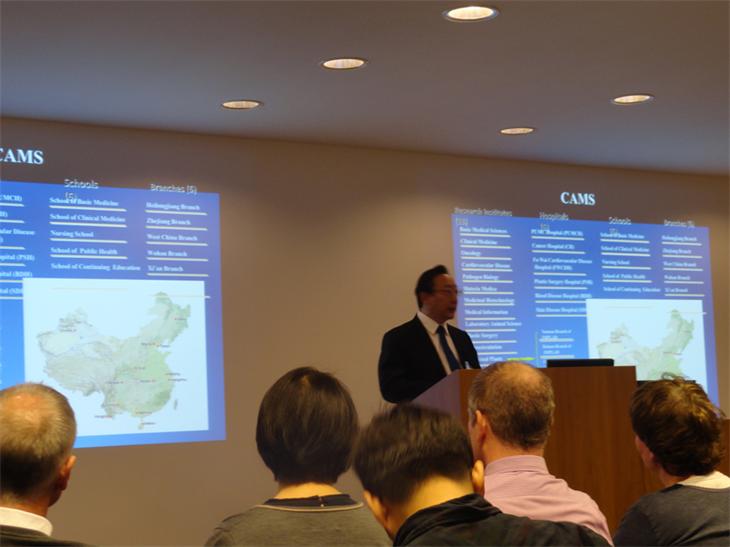The 2nd CAMS-Oxford University International Center for Translational Immunology symposium
Source:CSI
2014-04-01
The 2nd CAMS (the Chinese Academy of Medical Sciences) and Oxford University International Center for Translational Immunology (CTI) symposium has been held successfully at Oxford University from March 24th to 26th, 2014.
Six Chinese scientists attended this symposium, including Prof. Xuetao Cao, the president of CAMS and CSI (the Chinese society for immunology) and Prof. Bo Huang from CAMS. The symposium started at 8:40 a.m. Prof. Vincenzo Cerundolo of Oxford University, chair of this symposium, and Prof. Xuetao Cao made welcome speeches respectively, expressing the wish to promote the development of immunology research at both sides and countries, as well as to deepen the friendship and strengthen the cooperation between both organizations.


After that, researchers from both sides gave speeches around the following topics: recognition and transduction of innate immune signaling, visualization of immune molecules, molecular mechanisms of TCR (T cell receptor) activation, mucosal immunity and tumor immunity, angiogenesis and lymphangiogenesis, and clinical immunology, and these topics represent and reflect the direction and research hotspots from both sides.
The symposium not only showed the originality of basic research, but also the applicability of clinical research. The Oxford University representatives gave 6 speeches. Dr. Jan Rehwinkel gave speech with the title “Type I interferons and cell intrinsic immunity to virus infection”; Prof. Christian Eggeling introduced utilizing advanced microscopical technique to study the cellular immune response at the nanometer level; Prof. Simon Davis reported the molecular mechanism of leukocyte receptor triggering; Prof. Fiona Powrie gave speech on the intestinal immunity; Alain Townsend gave speech on the anti-flu antibody preparation titled of “Therapeutic antibodies to H7N9 influenza”; and Prof. David Jackson introduced the movement of lymphocytes in the lymph vessels and its relationship with inflammation and tumor.
As a keynote speaker, Prof. Xuetao Cao gave a speech titled of “Molecular sensors in innate immune response and immunotherapy”. Based on the work of his lab with the Chinese traditional philosophy of Yin and Yang, Prof. Cao introduced the molecular recognition mechanism of innate immune response, cellular variation, and novel immunotherapy induced, which made great impression to all participants. Prof. Bo Huang introduced the function of microparticles from tumor cells in the tumor immunology. Other representatives from CAMS introduced new developments in clinical immunology and translational medicine.
As an important part of the symposium, the host also prepared round table meeting. Prof. Vincenzo Cerundolo introduced the research of his team on iNKT and tumor immunology. Other representatives from Oxford University introduced their research area, discussing the directions and models for further cooperation, which may include tumor immunology, virus immunity, autophagy and immunity, memory T cells as well as metabolism and immunity.
During the whole symposium, representatives from both sides had a lot of topics discussed. Along with the meeting the host elaborately organized a visit of local hospital and a culture tour. This symposium is not only a platform for communication and exchange ideas among immunologists from both organizations, but also the platform for promoting understanding each other and friendship.
Six Chinese scientists attended this symposium, including Prof. Xuetao Cao, the president of CAMS and CSI (the Chinese society for immunology) and Prof. Bo Huang from CAMS. The symposium started at 8:40 a.m. Prof. Vincenzo Cerundolo of Oxford University, chair of this symposium, and Prof. Xuetao Cao made welcome speeches respectively, expressing the wish to promote the development of immunology research at both sides and countries, as well as to deepen the friendship and strengthen the cooperation between both organizations.


After that, researchers from both sides gave speeches around the following topics: recognition and transduction of innate immune signaling, visualization of immune molecules, molecular mechanisms of TCR (T cell receptor) activation, mucosal immunity and tumor immunity, angiogenesis and lymphangiogenesis, and clinical immunology, and these topics represent and reflect the direction and research hotspots from both sides.
The symposium not only showed the originality of basic research, but also the applicability of clinical research. The Oxford University representatives gave 6 speeches. Dr. Jan Rehwinkel gave speech with the title “Type I interferons and cell intrinsic immunity to virus infection”; Prof. Christian Eggeling introduced utilizing advanced microscopical technique to study the cellular immune response at the nanometer level; Prof. Simon Davis reported the molecular mechanism of leukocyte receptor triggering; Prof. Fiona Powrie gave speech on the intestinal immunity; Alain Townsend gave speech on the anti-flu antibody preparation titled of “Therapeutic antibodies to H7N9 influenza”; and Prof. David Jackson introduced the movement of lymphocytes in the lymph vessels and its relationship with inflammation and tumor.
As a keynote speaker, Prof. Xuetao Cao gave a speech titled of “Molecular sensors in innate immune response and immunotherapy”. Based on the work of his lab with the Chinese traditional philosophy of Yin and Yang, Prof. Cao introduced the molecular recognition mechanism of innate immune response, cellular variation, and novel immunotherapy induced, which made great impression to all participants. Prof. Bo Huang introduced the function of microparticles from tumor cells in the tumor immunology. Other representatives from CAMS introduced new developments in clinical immunology and translational medicine.
As an important part of the symposium, the host also prepared round table meeting. Prof. Vincenzo Cerundolo introduced the research of his team on iNKT and tumor immunology. Other representatives from Oxford University introduced their research area, discussing the directions and models for further cooperation, which may include tumor immunology, virus immunity, autophagy and immunity, memory T cells as well as metabolism and immunity.
During the whole symposium, representatives from both sides had a lot of topics discussed. Along with the meeting the host elaborately organized a visit of local hospital and a culture tour. This symposium is not only a platform for communication and exchange ideas among immunologists from both organizations, but also the platform for promoting understanding each other and friendship.


